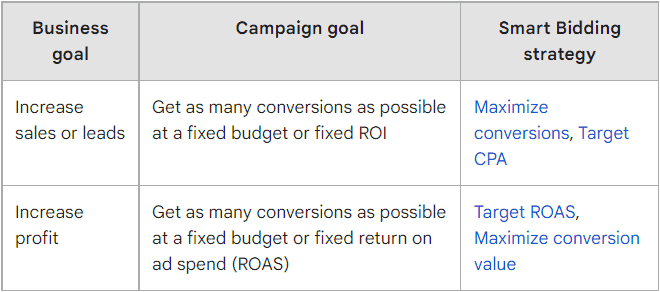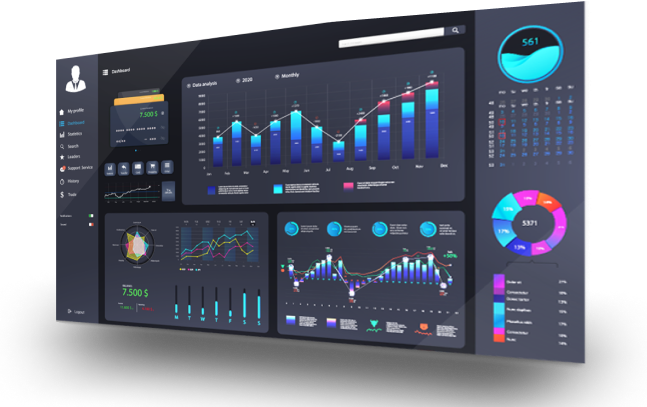Google Ads operates like an auction, where advertisers bid on opportunities to serve ads to targeted audiences. To date, there are two types of strategies by which advertisers can bid: manual or automated.
While manual bidding lets you decide the maximum amount you’re willing to pay per click on your ad, Google’s automated bidding allows you to use automated rules that manipulate bids to improve chances for whichever of two objectives you select: clicks or conversions.
What is Smart Bidding?
Smart bidding is a subset of automated bidding strategies that use real-time (or what is called “auction-time”) bidding to optimize for either conversion or conversion value. The options within this subset of bidding strategies are as follows:
- Maximize Conversions
- Maximize Conversion Value
- Target CPA
- Target ROAS
We’ll dive deeper into these strategies shortly…
What Goals Does Smart Bidding Help Achieve?
Smart bidding strategies are designed to help with either of two business goals: increase sales or leads, or increase profit.

Image Courtesy of Google Ads
How Does Maximize Conversions Bidding Work?
Maximize Conversions is a Smart Bidding strategy that automatically sets bids to help get the most conversions for your campaign, while spending your budget. It considers both your campaign’s historical data and contextual signals present at auction-time, and then uses machine learning to tailor the optimal bid, with the goal being to secure the cheapest conversions available for your budget. You can learn more about Maximize Conversions bidding with these resources from Google Ads.
How Does Target CPA Bidding Work?
Target CPA is a Smart Bidding strategy that lets you define a target cost-per-action (CPA) that is then used to set bids. Think of the target CPA you set as being an average cost you are willing to pay for each conversion. When using Target CPA during auction, Google will automatically find an optimal bid that is based on the target CPA you set, your campaign history, and other contextual signals, customizing bids based on the likelihood of the auction to convert. More information about Target CPA bidding can be found within these resources from Google Ads.
How Does Maximize Conversion Value Bidding Work?
Maximize Conversion Value is a Smart Bidding strategy designed to maximize the total conversion value of your campaign within your defined budget. It uses machine learning to adjust bids, basing those bids on your campaign’s historical data and contextual signals present at auction-time, as well as your conversion priorities (be it sales revenue or profit margins, which are defined when you set up conversion tracking within your account). This bid strategy can also be used with or without the Target ROAS smart bidding strategy—where without it, the strategy is designed to help you get as much conversion value as possible within your budget; and with Target ROAS, the strategy is designed to help you get as much conversion value as possible at the target return on ad spend. More information about Maximize Conversion Value bidding can be found within these resources from Google Ads.
How Does Target ROAS Bidding Work?
Target ROAS is a Smart Bidding strategy that can be used alone or in combination with either Maximize Conversions or Maximize Conversion Value bid strategies. It is designed to automatically set bids based on the predictive value of a potential conversion at each auction— setting low bids for actions with a likelihood of low-value conversions, and more aggressive bids for auctions that are likely to generate a high-value conversion—and ultimately, aiming to maximize the return on ad spend (ROAS). More information about Target ROAS bidding can be found within these resources from Google Ads.
What are the Benefits of Smart Bidding?
Google touts four key benefits to using Smart Bidding strategies, with the emphasis being on that these strategies help advertisers save time and improve performance. The benefits include advanced machine learning that leverages the power of algorithms and predictive modeling; having a wide range of contextual signals that inform this predictions; flexible performance controls that empower advertisers with the ability to select options based on their campaign goals; and transparent performance reporting that offers not just bid strategy reports, but also bid strategy statuses, ways test these strategies against current bidding methods with campaign drafts and experiments features, simulators that forecast performance and budgets, and alerts and notifications that help identify issues with conversion tracking and potential means by fixing them.
Getting Started with Smart Bidding Strategies
Implementing any of these smart bidding strategies isn’t particularly difficult. Google Ads makes them relatively easy to leverage in a few steps; however, they do require decisions be made with respect to attribution modeling, conversion-tracking and conversion value setup, and prioritization of campaign objectives. It is also important to know that there is a “learning phase” of sorts that campaigns using these strategies must endure (which informs the algorithms working behind the scenes), and that you should continue monitoring the performance of these strategies over time (as so many factors influence how they perform, and can create undesirable results if neglected).
If you’re interested in learning more about these smart bidding strategies and how they can be applied to your efforts, feel free to connect with our team for your free consultation.










